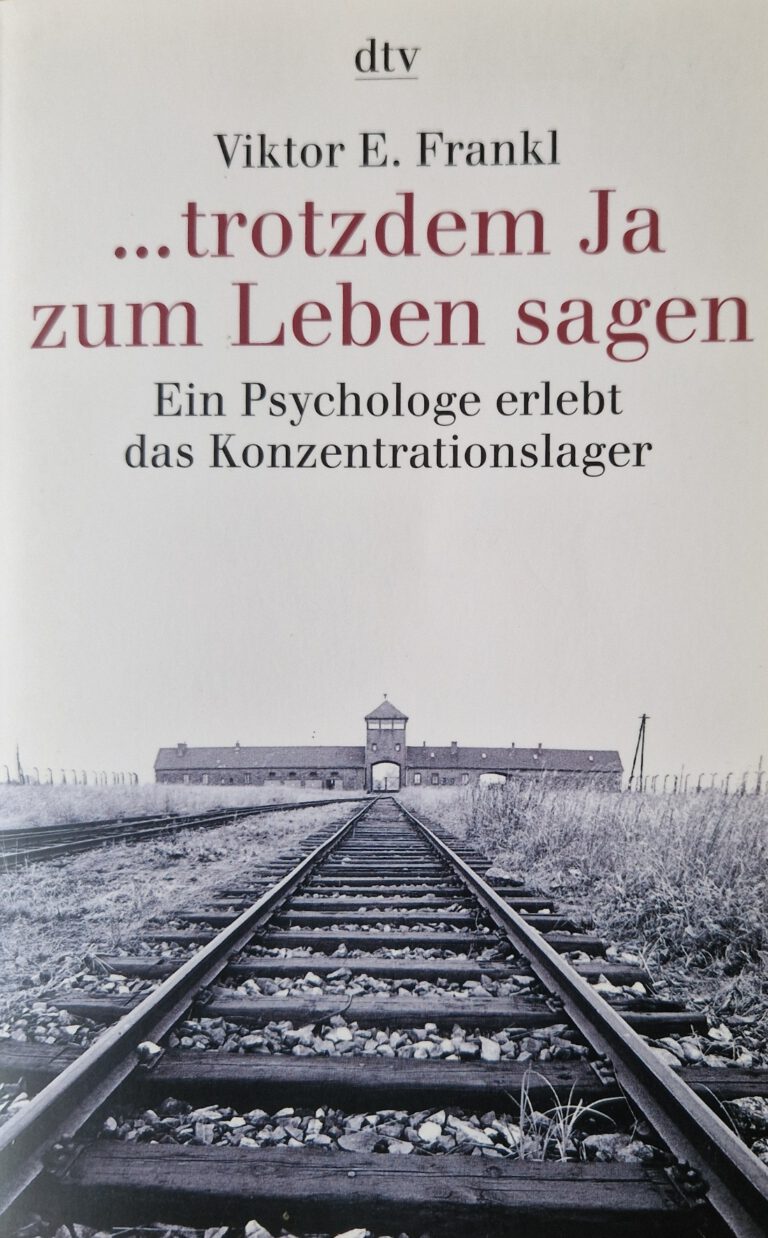Those who have found the „why“ of their lives can bear almost any „how“.
Friedrich Nietzsche
In short, our lives take on meaning through our actions, through loving, and through suffering.
Viktor Frankl
Logotherapy: a highly directive existential psychotherapy that emphasises the importance of meaning in the patient’s life especially as gained through spiritual values.
Merriam-Webster Online Dictionary
Vulnerability is the birthplace of love, belonging, joy, courage, empathy, and creativity. It is the source of hope, empathy, accountability, and authenticity. If we want greater clarity in our purpose or deeper and more meaningful spiritual lives, vulnerability is the path.
Brené Brown, Daring Greatly
„Yes to Life: In Spite of Everything“ (…trotzdem Ja zum Leben sagen) is a powerful work by renowned Austrian psychiatrist and Holocaust survivor Viktor E. Frankl.
Also published under the title, „Man’s Search for Meaning,“ it details his experiences in Auschwitz and three further Nazi concentration camps during World War II, providing insight into the origin of Frankl’s ideas and an outline of Logotherapy, the psychotherapeutic method he subsequently developed and taught.
„Man’s Search for Meaning“ is drawn from three public lectures Frankl delivered in his native Vienna in 1946, just months after his liberation from Türkheim (which was part of the Dachau KZ), near Munich, the fourth of the concentration camps in which he had been incarcerated since 1942. The others were, in chronological order: Theresienstadt, Auschwitz, and Landsberg.
The context is crucial: Vienna was in ruins, the audience consisted of people who had suffered terribly throughout the war, and Frankl himself had recently lost most of his entire extended family, including his parents, wife, and siblings.
One example of the excruciating pain he suffered concerned his first marriage. While still in Vienna he met his first wife, Tilly Grosser. They were among the last Viennese Jews to get permission from the National Socialist authorities to wed.
Under the Nazi regime, Jews were forbidden to have children even if they were married, and Tilly had to sacrifice the foetus she was carrying. She later died of typhoid in Bergen-Belsen. Frankl’s book „The Unheard Cry For Meaning“ (1978) was dedicated to their unborn child.
Despite his unimaginable personal tragedy, he fills the lectures with encouragement, hope, and purpose. They are a stunning affirmation of the meaning of life and a clarion call to each listener (reader) to furnish our own lives with a personal sense of purpose.
The central argument Frankl makes is that life has meaning whatever the circumstances, even when profound suffering is encountered. The title itself is the core message: we can and must say „yes to life“ not because of circumstances, but in spite of them.
It is easy to say „yes to life“ when everything is going well. If that „yes“ is contingent on circumstances, however, it can never be sustained because, as we all know, circumstances change as much as the weather in my native Ireland. Everything, even our existence in this incarnation, is transient.
Frankl directly challenges the sense of meaninglessness and despair that plagued post-war European society, arguing that even when we are deprived of everything — home, family, basic human rights, profession, dignity — we still retain the freedom to choose our attitude toward our suffering.
Three fundamental questions lead him to this conclusion:
What is meaning?
Frankl asserts that life encompasses unconditional meaning. It is not something we invent for ourselves, but a „given” of the reality of life which we can discover through the specific situations and challenges we face each day. Meaning is found out there in the world, not within our own psyches.
How do we find meaning?
He outlines the three main avenues through which we can discover meaning.
By creating a work or doing a deed (such as writing this essay). This is the value of achievement and contribution.
By experiencing something or encountering someone: This is the value of love, beauty, and nature. Love, in particular, is defined as seeing the potential in another person and helping them achieve it.
By the attitude we take toward unavoidable suffering: This is the most profound of the three. When we are faced with a fate we cannot change, we can choose to explore its immanent gift and the opportunity it presents. We can thereupon turn our predicament into a human accomplishment. Suffering ceases to be experienced as suffering the moment we find its meaning.
What is our responsibility? To help us discover our own unique purpose, Frankl introduces the concept of life as a „series of questions.“ It is not we who get to ask life what the meaning is; rather, life asks us, in every hour of every day, what we are doing to make our lives meaningful. Our responsibility is to answer these questions in alignment with our inner values, through our feelings, our beliefs, our choices, and our actions.
The text is filled with the raw, urgent energy of its time, yet the message is timeless. Frankl does not dismiss pain or suggest a naive, optimistic outlook. This is no „Think positive and all will be well“ tract. It could not be further removed from the trendy „Tyranny of Positive Thinking“ which is so pervasive in pop psychology today.
Instead, he provides a robust, philosophical, and psychological framework for facing adversity with dignity and purpose. He argues that the ultimate of human freedoms is the ability „to choose one’s attitude in any given set of circumstances.“
„Yes to Life“ is a compact, immensely powerful, and accessible portal into Frankl’s philosophy or Weltanschauung. It is a testament to the resilience of the human spirit and a call to embrace our responsibility to find meaning, no matter what life may bring. It is not only a historical document but also a vital and deeply relevant guide for anyone facing personal struggle, uncertainty, or the search for purpose in life today.
Frankl was uniquely able to observe the way both he and others coped (or didn’t) with the experience of the Nazi Concentration Camps. He noticed that it was the men who comforted others and who gave away their last piece of bread who survived the longest and who became proof of the fact that everything can be taken away from us except the ability to choose our attitude in any given set of circumstances.
The sort of person the concentration camp prisoner became was the result of an inner decision and not of the camp conditions alone. Only those who allowed their inner hold on their emotional and spiritual selves to subside eventually fell victim to the camp’s degenerating influence while the inmates who transcended those experiences turned them into an inner triumph. It was in Auschwitz that Frankl came to believe man’s deepest desire is to search for meaning and purpose.
Even when everything is taken from us, one final freedom remains — the freedom to choose our attitude toward our fate. In the camps, Frankl began speaking with other prisoners — not as a doctor, but as a fellow sufferer.
He reminded them of reasons to keep living: a child waiting to be seen again, a love not yet lost, a dream as yet unfulfilled, a purpose still worth our perseverance.
Some fellow inmates survived because of that spark. Others perished, but with an inner peace and serenity no guard could ever steal.
When the war finally ended, Viktor Frankl weighed barely forty kilogrammes. He had lost his parents, his wife, and every possession — except for one thing: the book he had already written in his mind.
It became the foundation of Logotherapy — „healing through meaning.“ Frankl taught that while medicine can ease pain, only purpose can heal it.
As a person who has experienced much adversity throughout my life — though nothing like that of Viktor Frankl and his fellows — I have been blessed with a second chance, so to say: life in addiction recovery since 2003.
At the age of forty-two, I began working the Twelve Step programme of AA, then CoDA (Co-dependents Anonymous), and now also ACA (Adult Children of Alcoholics). The latter fellowship name is somewhat misleading since, from its inception, it has been geared towards anyone who wishes to recover from the experience of growing up in an emotionally dysfunctional environment.
Central to the Twelve Step approach is one of the maxims of Frankl’s Logotherapy which states: „Live as if you were already living for the second time, and as if you had made the mistakes you are about to make now“. This „fictive autobiographical view of one’s life“ heightens our awareness, strengthens our capacity for compassion, and re-enforces our sense of responsibility.
While the stated aim of AA is to help the still-suffering alcoholic get sober, ACA has set itself a much broader goal. In the foreword to the Big Red Book of ACA we find the following mission statement: Adult children are committed to halting the generational nature of family dysfunction for the greater good of the world.
Let that sink in for a moment!
In terms of purpose, those of us in recovery are really privileged. Step Twelve tells us to carry the message to others and to practice the principles of recovery in all our affairs. We understand the paradox that we need to give away our recovery to others in order to continue growing in ours.
As an Adult Child, I have found a purpose that feels so powerful, I might need a few incarnations to fulfil it. The following questions are an integral part of my daily recovery practice: Where/in which situation am I now? What can I do to serve in the best possible way? For whom? How? Why?
My endeavours are helped by the simple, timeless message delivered by Viktor Frankl in his both his words and how he lived his life: „He who has a why to live can bear almost any how.“ This he borrowed from one of his great German-speaking predecessors and mentors, Friedrich Nietzsche.
Another widely recognised message from Frankl’s work is: „Between stimulus and response there is a space. In that space lies our power to choose our response. In our response lies our growth and our freedom.“
This concept has become central to my daily recovery practice.
Cultivating, maintaining, and expanding the gap between stimulus and response is a central tenet of the Positive Intelligence (PQ) Mental Fitness modality I began using some years ago. In the meantime, I have qualified as a Certified PQ Coach and use many of the concepts and practices in my coaching approach.
In the absence of Mental Fitness, we react impulsively to whatever stimuli we pick up, — through our inner dialogue or from the behaviour of others. This impulsive, reactive mode is the re-enactment of the trauma induced coping strategies and survival mechanisms of our childhood, and adolescence.
While these once served us well to survive adversity when we were both powerless and helpless, they have now become runaway trains that cause much wreckage in our lives, the lives of those we love, and to our beautiful Blue Planet.
Until we learn to identify and intercept our Saboteurs (i.e. Judge, Controller, Hyper-Rational, Pleaser, Victim, etc.), regulate our autonomic nervous system, and cultivate the Sage Powers of Compassion, Explore, Innovate, Navigate, and Activate, we will remain stuck in the old, self defeating, reactive behavioural patterns.
With Mental Fitness comes awareness, compassion, and new behaviours. On the heels of these new behaviours, our brain rewires itself and our thinking is transformed. It is thus that we can attain the healing, the growth, and the freedom to which Frankl so enthusiastically refers again and again in his life’s work.






